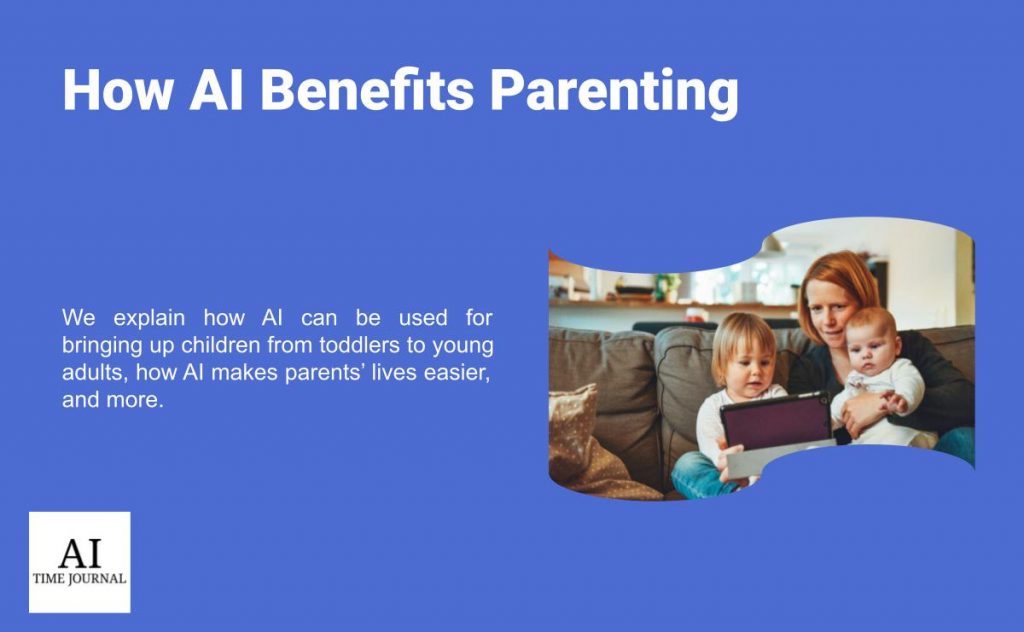
Being a parent and bringing up children is difficult in many aspects – emotionally, psychologically, physically, and mentally. Young parents surf the net, consult their parents, read books, and try to buy the best things to provide their children with the best lives possible. And modern technologies, such as phones, the Internet, and even Artificial Intelligence, can back up adults in raising their heirs. It may seem unbelievable, but in parenting, AI is an innovation able to enhance various processes and save time.
In this article, I will talk about the most crucial and must-know points about AI in parenting and the areas that can be improved. Also, I must underline that artificial intelligence is applied in many various spheres, including daily and professional lives. To learn more about AI in daily life, access this AITJ article: Can Robot Vacuums Clean Multiple Rooms? But if you would rather expand your knowledge on some professional topics, access these AITJ articles: How AI Benefits Small Businesses and Important Uses of AI in Translation.
AI for Toddlers & Little Children
If you are a parent of a toddler or a little child, you should definitely learn how to use AI for your benefit. It is frustrating to understand why the baby cries, when it is time to feed the toddler, and when it should be taken to the hospital. Thanks to AI, this is not a problem anymore. A group of researchers trained artificial intelligence mechanisms to discern a baby’s regular and distress cries. Despite this natural language processing (NLP) based methodology, you should also take your parent’s instincts into account.
Moreover, many AI-powered apps that produce white sounds, such as rain, waves, wind, and more, can help calm the baby. Many of these learn the infant’s sleeping patterns and, based on them, try to find the reasons why the baby won’t sleep at night.
AI brings many benefits; however, it can also have a negative impact on little children. There comes a time when children start watching cartoons on YouTube or playing with more sophisticated toys than a rattle. Nowadays, AI is embedded in toys, video games, and YouTube recommendations; therefore, children interact with this technology in many different ways. So, if you want your children to consume and adopt some moral & ethical norms or specific knowledge, you should watch carefully what your child is playing or streaming at a young age.
AI for Teenagers
The parents of teenagers have different worries than those that appear when the child is little. Parental expectations include good marks, prevention of bad habits (e.g., smoking, doing drugs, drinking), decreasing the influence of social media, etc. Artificial intelligence can help with many of the troubles and concerns that teenagers experience.
For instance, children between 10 and 18 tend to have a time shortage due to school, homework, and many out-of-school activities. Parents can help their children enhance their time-management techniques and ensure time for good rest to prevent any psychological trauma and emotional burnout. Some great time-management tools are listed in this AITJ article.
Additionally, AI can help parents manage their expectations of their children’s academic performance. However, you should not rely on the information generated by the technology, as your child’s performance will also depend on their classmates’ performances, educational environment, and many other factors.
Parents always worry about their children’s security. So location intelligence can bring many benefits when trying to identify your child’s location. For instance, with the help of deep learning, computers can analyze numerous photos and provide you with the most accurate results. Google Photo Search is the best example of this technology.
AI for Young Adults
Often, young adults have their own lives and start living separately from their parents, attending university, and forming new acquaintances. Although parents’ influence on their grown-up children is minimal, there are still some ways in which AI can enhance the parent-child relationship.
For instance, in the very first stages of young adults’ independent lives, parents sometimes send them some support money. These financial relationships can be improved with the help of many AI-powered financial services, including crypto and blockchain services. To learn more about the best companies in this industry, read this AITJ article: Top Blockchain Companies to Watch in 2022.
How AI Makes Parents’ Lives Easier?
AI is broadly applied in daily life; hence, an AI-powered robot overtaking some household activities could be helpful to many parents, especially those with toddlers. Such things as smart devices (e.g., watches, fridges, etc.) and cleaning robots can perform many activities to save their owners time. However, one more important aspect every parent worries about is their children’s safety. AI can assist people in this matter as well.
For instance, AI-integrated alarm and camera systems implement machine learning methods and facial recognition to create a list of people who visit your home often. In this case, the system will easily identify strangers and inform the owner of the alert. Integrating such systems into your home is a step toward making it automated and fully protected.
Self-driving cars are one more trend rapidly increasing in popularity. They can bring many benefits to parents, including safety. Autonomous vehicles can adjust to the changing road situation, learn from new situations, choose the safest and fastest route, track traffic conditions, and allow people not to concentrate on the road so much. For the always-tired parents of toddlers and little children, the absence of necessity to constantly focus on the road might be the biggest advantage.
To find out more about the best autonomous vehicles, take a look at this AITJ article: Top Autonomous Vehicle Companies to Watch in 2022.
